新目标英语级unit重点难点考点及疑点注释
新目标英语九年级第1-5单元重点难点考点及疑点内容讲解注释
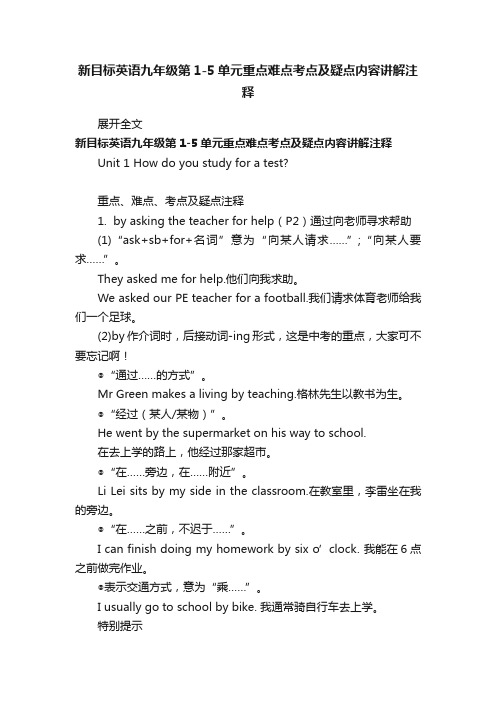
新目标英语九年级第1-5单元重点难点考点及疑点内容讲解注释展开全文新目标英语九年级第1-5单元重点难点考点及疑点内容讲解注释Unit 1 How do you study for a test?重点、难点、考点及疑点注释1. by asking the teacher for help(P2)通过向老师寻求帮助(1)“ask+sb+for+名词”意为“向某人请求……”;“向某人要求……”。
They asked me for help.他们向我求助。
We asked our PE teacher for a football.我们请求体育老师给我们一个足球。
(2)by作介词时,后接动词-ing形式,这是中考的重点,大家可不要忘记啊!◎“通过……的方式”。
Mr Green makes a living by teaching.格林先生以教书为生。
◎“经过(某人/某物)”。
He went by the supermarket on his way to school.在去上学的路上,他经过那家超市。
◎“在……旁边,在……附近”。
Li Lei sits by my side in the classroom.在教室里,李雷坐在我的旁边。
◎“在……之前,不迟于……”。
I can finish doing my homework by six o’clock. 我能在6点之前做完作业。
◎表示交通方式,意为“乘……”。
I usually go to school by bike. 我通常骑自行车去上学。
特别提示by作副词时,相当于near,意为“靠近”。
The thief stole the money when no one was by.当旁边无人的时候,小偷偷走了钱。
短语◎by and by “不久”,“一会儿”。
It’s 12 o’clock now and we will go home by and by.现在12点了,过一会儿我们就要回家了。
九年级英语新目标上 unit 11 重点、难点、考点及疑点注释辅导1
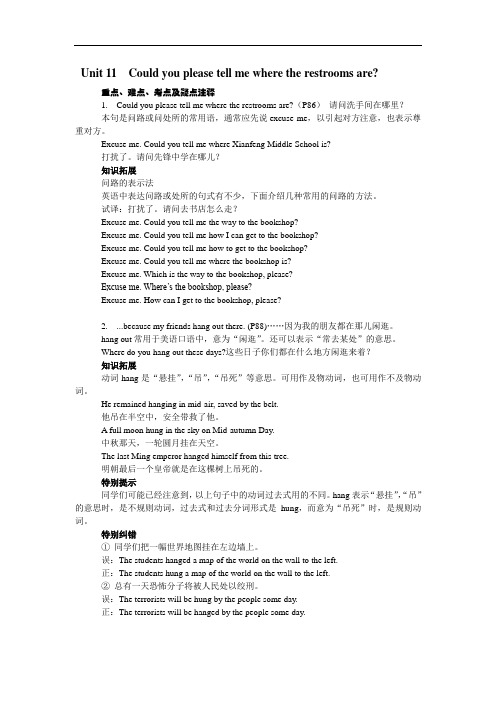
Unit 11 Could you please tell me where the restrooms are?重点、难点、考点及疑点注释1. Could you please tell me where the restrooms are?(P86)请问洗手间在哪里?本句是问路或问处所的常用语,通常应先说excuse me,以引起对方注意,也表示尊重对方。
Excuse me. Could you tell me where Xianfeng Middle School is?打扰了。
请问先锋中学在哪儿?知识拓展问路的表示法英语中表达问路或处所的句式有不少,下面介绍几种常用的问路的方法。
试译:打扰了。
请问去书店怎么走?Excuse me. Could you tell me the way to the bookshop?Excuse me. Could you tell me how I can get to the bookshop?Excuse me. Could you tell me how to get to the bookshop?Excuse me. Could you tell me where the bookshop is?Excuse me. Which is the way to the bookshop, please?Excuse me. Where’s the bookshop, please?Excuse me. How can I get to the bookshop, please?2. ...because my friends hang out there. (P88)……因为我的朋友都在那儿闲逛。
hang out常用于美语口语中,意为“闲逛”。
还可以表示“常去某处”的意思。
Where do you hang out these days?这些日子你们都在什么地方闲逛来着?知识拓展动词hang是“悬挂”,“吊”,“吊死”等意思。
新目标英语七年级下册第十单元重点难点解析2

新⽬标英语七年级下册第⼗单元重点难点解析2新⽬标英语七年级下册第⼗单元重点难点解析 2重点难点解析1.Where did you go on vacation? 你去哪⼉度假了? I went to the mountains. 我去了⼭区。
(1)这是⼀个特殊疑问句。
由“特殊疑问词+助动词+主语+动词+其它?”构成。
由于是询问已发⽣的动作(过去的事情),所以助动词⽤过去式did,其后的动词⽤原形 e.g. —Where did you go yesterday? 你昨天去了哪⼉? —I visited my friends. 我去拜访了朋友。
(2)与go to the mountains结构类似的词组还有: go to the beach 去海边 go to summer camp 去夏令营 go to New York 去纽约市 go on vacation 去度假 go to a trip 去旅⾏ go to the movies 去看电影2.Did you go to central Park? 你去中⼼公园了吗? Yes, I did. 是的,去了。
这是⼀个⼀般疑问句,由助动词提问,回答也⽤助动词。
由于询问的是发⽣在过去的事,所以助动词⽤过去式did。
⼀般过去时的⼀般疑问句的句⼦结构: Did+主语+动词原形+其它+?回答:※在过去时态中,⽆论主语是第⼏⼈称,是单数还是复数,助动词⼀律⽤ did:e.g.3. I stayed at home. 我呆在家⾥。
(1)stay可以是及物动词,也可以是不及物动词。
当它作不及物动词时就不能直接接宾语,其后接相应的介词短语,表地点(留在某地)或表状态(保持某种状态)。
stay in the office 继续任职(掌权) stay awake 不睡(醒着) stay in the army 留在部队中 stay at home 呆在家中 e.g. We're staying in the same hotel. 我们住在同⼀家旅馆。
九级英语新目标上unit重点难点考点及疑点注释辅导

Unit 2 I used to be afraid of the dark.一、remember的反义词是forget,两者用法相同,后面可跟名词,动名词或动词不定式。
1. remember/forget doing sth表示记得/忘记做过某事”强调事情已经做了。
I remember posti ng your letter.我记得替你寄过信了。
They forget locki ng the door.他们忘记锁过门了。
2. remember/forget to do sth表示记得/忘记去做某事”强调事情还未做。
I remember to post your letter我记得替你寄信。
They forget to lock the door.他们忘了锁门。
二、反意疑问句,表示说话人提出某种情况或看法,询问对方是否同意。
类型:( 1 )主句为肯定陈述句时,附加疑问句为:系动词/情态动词/助动词的否定(缩写)形式+主语。
The girl went to school late yesterday,didn 't she? 昨天那个女孩上学迟到了,是吗?(2) 主句为否定陈述句(包括肯定形式中有never, seldom, hardly, few, little,nobody 等否定意义的词)时,附加疑问句为:系动词/情态动词/助动词的肯定形式+主语。
You have n ever bee n to Beiji ng, have you你没有去过北京,是吗?(3) 主句为祈使句时,附加疑问句为:will或shall+主语。
Open the window, will you? 打开窗户,好吗?Let' s go to school, shall w我们上学去吧,好吗?三、terrified为形容词,意为受惊吓的,恐惧的”表示害怕……,恐惧.... ”固定用法be terrified of 相当于be afraid of。
新目标英语级unit重点难点考点及疑点注释

新目标英语级u n i t重点难点考点及疑点注释文稿归稿存档编号:[KKUY-KKIO69-OTM243-OLUI129-G00I-FDQS58-新目标英语9年级unit10重点、难点、考点及疑点注释Unit 10 By the time I got outside,the bus had already left.重点、难点、考点及疑点注释1. When I got to school, I realized I had left my backpack at home. (P76)我到学校时才发现把书包落在家了。
(1)had left my backpack at home 这是一个过去完成时的句子,表示在过去某一时间或某一动作之前完成的动作或存在的状态。
By three o’clock yesterday afternoon we had finished the work.到昨天下午三点,我们已经完成了工作。
She had learned a lot of English before she went to school.在上学之前,她已经学会了很多英语。
(2)left是leave的过去式,在此处意为“遗忘”,“忘记”,后面常有地点状语。
Li Min left his dictionary in the reading-room yesterday.昨天李民把词典忘在阅览室里了。
特别提示forget作“遗忘”解时,后面没有“遗忘”的地点。
I have forgotten the book. 我忘记拿书了。
2. My alarm clock didn’t g o off, and by the time I woke up, my father had already gone into the bathroom and I had to wait for him to come out. (P78)我的闹钟坏了,因此等我醒来的时候,我父亲已经进去洗澡了,我只好等他出来。
新目标英语七年级下册重点难点解析unit1

新目标英语七年级下册重点难点解析unit1一、重点词汇pen pal=pen friend笔友likes and dislikes 好恶;爱憎her name她的名字a little一点儿like doing sth.喜欢做某事go to the movies去看电影write to sb.给某人写信on weekend 在周末at school 在学校an action movie 一部动作片二、重点句型1、Where is your pen pal from?He’s from Korea.2、Where is John’s pen pal from?He’s from Japan.3、Where is her pen pal from?She’s from Brazil.4、Where does he live?He lives in South Korea.5、What language does she speak ? 她讲什么语言?6、She speaks English and Spanish . 她讲英语和西班牙语。
7、Does she speak French ? 她讲法语吗?三、重点难点分析1. This is my new pen pal. She’s from Australia.这是我的新笔友。
她是澳大利亚人。
be from来自于,是……地方的人= come from2.What language does she speak?她讲什么语言?She speaks Spanish.她讲西班牙语。
3.first name(family name) 姓last name名英语姓名与中文姓名是不同的,请看下面的示意图:从以上示意图可以知道,中英文姓名的写法相反,中文姓名的姓放在前,而英文的姓放在后。
4. I like going to the movies with my friends and playing sports .like“喜欢”,后多跟动词ing形式。
九级英语新目标上unit7重点难点考点及疑点注释辅导
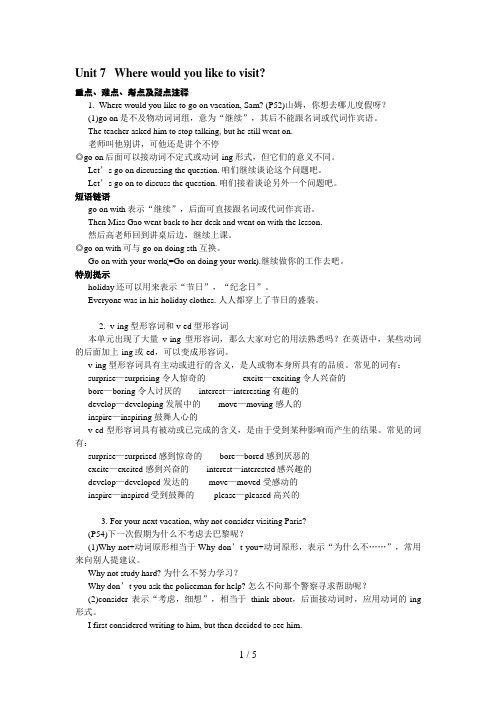
Unit 7 Where would you like to visit?重点、难点、考点及疑点注释1. Where would you like to go on vacation, Sam? (P52)山姆,你想去哪儿度假呀?(1)go on是不及物动词词组,意为“继续”,其后不能跟名词或代词作宾语。
The teacher asked him to stop talking, but he still went on.老师叫他别讲,可他还是讲个不停◎go on后面可以接动词不定式或动词-ing形式,但它们的意义不同。
Let’s go on discussing the question. 咱们继续谈论这个问题吧。
Let’s go on to discuss the question. 咱们接着谈论另外一个问题吧。
短语链语go on with表示“继续”,后面可直接跟名词或代词作宾语。
Then Miss Gao went back to her desk and went on with the lesson.然后高老师回到讲桌后边,继续上课。
◎go on with可与go on doing sth 互换。
Go on with your work(=Go on doing your work).继续做你的工作去吧。
特别提示holiday还可以用来表示“节日”,“纪念日”。
Everyone was in his holiday clothes. 人人都穿上了节日的盛装。
2. v-ing型形容词和v-ed型形容词本单元出现了大量v-ing型形容词,那么大家对它的用法熟悉吗?在英语中,某些动词的后面加上-ing或-ed,可以变成形容词。
v-ing型形容词具有主动或进行的含义,是人或物本身所具有的品质。
常见的词有:surprise—surprising 令人惊奇的 excite—exciting令人兴奋的bore—boring 令人讨厌的 interest—interesting 有趣的develop—developing 发展中的 move—moving 感人的inspire—inspiring 鼓舞人心的v-ed型形容词具有被动或已完成的含义,是由于受到某种影响而产生的结果。
新目标八级下Unit重难点详解

Unit 10 It 's a nice day, is'nt?重难点详解1.It looks like rain, doesn 't it? 看起来要下雨了,是吗?(1)it 作代词,在本句中指“天气”,it 还可以指“时间,距离”。
如:It 's a fine day today. 今天天气很好。
It 's seven o'clock. 现在7 点了。
It 's two kilometers away from my home to school. 从我家到学校有两公里远。
(2)本句中look 作系动词,后可接形容词、名词。
如:She looks very sad. 她看上去很伤心。
You look very happy today. 今天你看上去很高兴。
2.What do you think of the school? 你觉得这所学校怎么样?句中的of可用about替代,同义句式为"How do you like…?”。
如:What do you think about /of my going to study abroad? 我出国去读书你觉得怎么样?How do you like my new sweater? 你觉得我的新毛衣怎么样?3.This bus is always late, isn't it? 这路公共汽车总是晚点,是不是?附加疑问句中的主语要用代词,如果陈述句的主语是代词,用相应的代词即可,如果陈述句的主语是名词,用相应的代词指代该名词。
如:She is your teacher, isn't she ?她是你的老师,是吗?His mother gets up at six in the morning, doesn 'tshe? 他的母亲每天早上 6 点钟起床,是吗?4.Yes, at least it isn't raining. 是啊,至少天不是在下雨。
新目标初中英语教材重点难点梳理

新目标初中英语教材梳理七年级(上)Units 1-9【重点短语】1.用英语in English (in+语言:用....语言)2.名first name=given name3.姓last name=family name4.祝你有愉快的一天have a good day5.我的家庭照my family photo= a photo of my family6.为……而感谢Thanks/Thank you for sth. / doing sth.7.向某人要某物ask sb. for sth8.打2819176找某人call sb. at 28191769.一串钥匙a set of keys a set of(一套)10.迟到be late for11.在电视上看球赛watch ball games on TV12.下课后after class13.考虑;思考think about14.询问某人的饮食习惯ask sb. about his/her eating habits15.给你Here you are16.以优惠的价格出售at very good prices17.进行学校旅游have/ go on a school trip18.忙于做某事be busy doing sth/with sth.19.玩得开心have a good time/ have fun/ enjoy oneself20.举行英语晚会have an English party21.妇女节Women’s Day22.国庆节National Day23.儿童节Children’s Day24.完成做某事finish doing sth.25.快点come on26.一双a pair of27.去旅行go travelling28.指给某人某物show sb. Sth.29.享受这次航班enjoy the flight30.到处走动;不停走动move about31.on the tree(本身)in the tree(外来物)32.nine--ninth--ninety33.class Four=the four class【重点难点突破】1. family,house与home的区别:family指“家,家庭,家里的人”。
新目标英语七年级上册重、难点剖析(Unit7)

新目标英语七年级上册重、难点剖析(Unit7)新目标英语七年级上册重、难点剖析(Unit 7)Unit 7 How much are these pants?1.—How much is this T-shirt? 这件T恤多少钱?—It’s seven dollars. (P41) 七美元。
1)how much意为“(价格)多少”,用于询问物品的价格,句型为“How much + be +主语?”。
当主语是可数名词单数或不可数名词时,be动词用is,答语为:It’s…;当主语是可数名词复数时,be 动词用are,答语为:They’re…。
如:—How much is the dictionary? 这本字典多少钱?—It’s ten dollars. 十美元。
—How much are these bananas? 这些香蕉多少钱?—They’re 6 dollars. 六美元。
how much还可以用来询问数量,意为“有多少”,用来修饰不可数名词。
如:How much meat do you need? 你需要多少肉?How much bread do they have? 他们有多少面包?注意:如果修饰可数名词复数,则应该用how many。
如:How many English books do you have? 你有多少本英语书?How many boxes do you want? 你想要多少个盒子?2) dollar是美国、加拿大等国家的的货币单位,符号为$。
如果要用符号表示,则符号要写在数字前面。
如:$ 2,000 二千美元。
2. —Can I help you? 你需要帮忙吗?—Yes, please. (P43) 是的,请。
Can I help you?包含两种含义:1) 服务人员或营业员主动询问顾客需要的常用语,表示“你需要点什么吗?”。
如果顾客需要购物时,可回答Yes, please. 如果仅是逛街,可回答No, thanks. I’m just looking around. 或Just have a look. 如:—Can I help you? 你要买什么?—Yes, please. I ‘d like some apples. 我要买些苹果。
新目标英语九年级期末复习 U1-10重点知识梳理
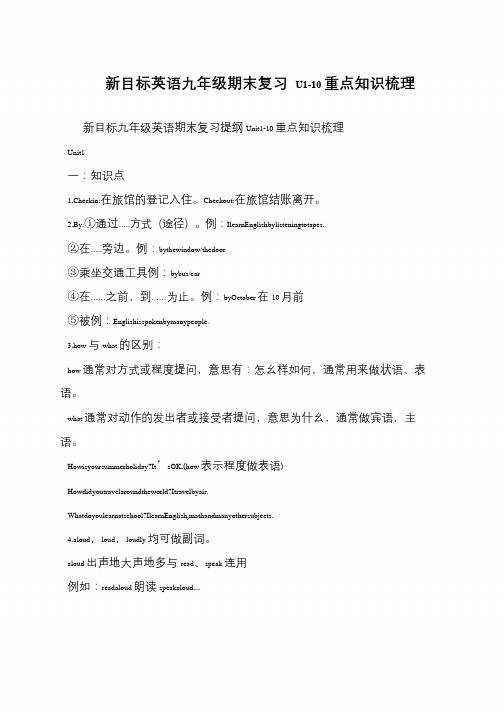
新目标英语九年级期末复习U1-10 重点知识梳理
新目标九年级英语期末复习提纲Unit1-10 重点知识梳理
Unit1
一:知识点
1.Checkin:在旅馆的登记入住。
Checkout:在旅馆结账离开。
2.By:①通过…..方式(途径)。
例:IlearnEnglishbylisteningtotapes.
②在…..旁边。
例:bythewindow/thedoor
③乘坐交通工具例:bybus/car
④在……之前,到……为止。
例:byOctober 在10 月前
⑤被例:Englishisspokenbymanypeople.
3.how 与what 的区别:
how 通常对方式或程度提问,意思有:怎幺样如何,通常用来做状语、表语。
what 通常对动作的发出者或接受者提问,意思为什幺,通常做宾语,主语。
Howisyoursummerholiday?It’sOK.(how 表示程度做表语) Howdidyoutravelaroundtheworld?Itravelbyair. Whatdoyoulearnatschool?IlearnEnglish,mathandmanyothersubjects. 4.aloud,loud,loudly 均可做副词。
aloud 出声地大声地多与read、speak 连用
例如:readaloud 朗读speakaloud....。
七年级英语上册 重点精讲解析 人新目标教版

人教版新目标英语7年级上册(精讲)Unit 1 M name' Gina重点、难点、考点及疑点注释1 heo它不仅可以用于熟人、朋友之间,还可用于和陌生人说话,表示问好。
(1)Heo, Am! 你好,艾米!注意:两人见面相互问候时,heo意思是“你好”;在打招呼或打电话时,相当于汉语里的“喂”。
Heo, thi i Michee 喂,我是米歇尔。
(电话用语)2Heo还有一个手足兄弟hi,hi听起来更为随意。
“Hi, m name' Ben”嗨,我是本。
heo,hi都较为简单随意,而陌生人初次见面更常见的是较为正式的问候语:“How do oudo”但熟悉之后也可以说:“How are ou ”“How are ou doing ”“How are ou gettingon ”怎么回答这些问候呢—A:How do ou do B:How do ou do—A:How are ou B:I'm OK, than ou3还有一种较为常见的见面用语,即“Nice to meet ou! ”或“Gad to meet ou! ”回答很简单:“Nice to meet ou, too ”(见到你也很高兴。
)大家或许还见过“Nice meeting ou!”千万不要搞错了,这是送别的话,意思是“见到你真是太好了”、“再见”。
两人刚要握手,你就赶人走,岂不要闹笑话2 teeeThat' a rightIt' m ed喜剧Do ou now Home AoneIt' a comed你知道《小鬼当家》吗它是一部喜剧。
★documentar纪录片Kai Guo Da Dian i a documentar 《开国大典》是一部纪录片。
★thrier恐怖片Wu Ye Xiong Ling i a thrier 《午夜凶铃》是一部恐怖片。
★action movie动作片Do ou now Hero It' an action movie你知道《英雄》吗它是一部动作片。
新版新目标英语九年级unit知识点总结
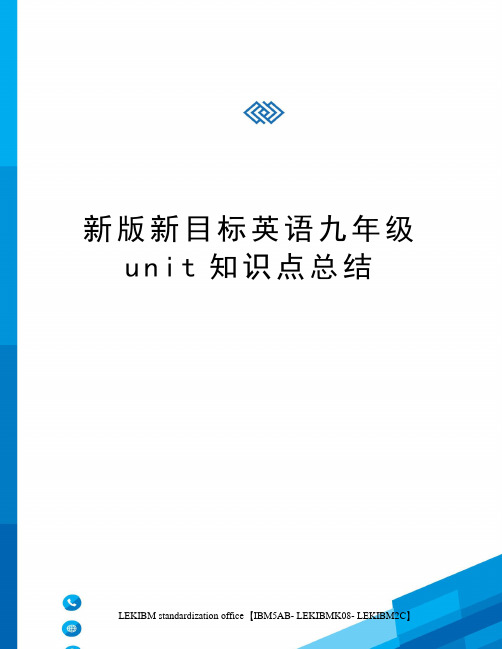
新版新目标英语九年级u n i t知识点总结LEKIBM standardization office【IBM5AB- LEKIBMK08- LEKIBM2C】Unit 1 How can we become good learners?Section A1.pronunciation n.发音;发音法, v. pronouncePlease tell me how to pronounce the word.What’s the pronunciation of the word “text”她认识很多法语单词,但发音不正确。
She knows a lot of French words,but pronounce them incorrect. 2.aloud/loud/loudly(1) aloud adv 出声指出声能让人听见,但声音不大 read aloud 大声朗读(2) loud adj./adv 作adv时,常与speak, talk, laugh等连用。
多用于比较级,须放在动词后。
Speak louder, please. I can’t hear you clearly.(3) loudly adv 与loud 同义,有时两者可替换使用,但往往含有令人讨厌或打扰别人的意思,可位于动词之前或之后。
He does not talk loudly or laugh loudly in public.The be talking loudly in the class and it makes the teacher unhappy.3.a sk sb for…向某人请求 ask the teacher for help向老师请求帮助ask sb to do sth.请求某人干某事 ask sb not to do sth请求某人不要干某事4.too... to...太……而不能……too...to...可以与so...that(如此……以至于……)或 enough to do...(足够……以至于……)转换。
新目标八年级英语下册1-10单元知识点及难点精讲及归纳

新目标八年级英语下册1-10单元知识点及难点精讲及归纳英语小屋八年级(下)英语知识讲解每单元均有重要得字、词得辨析及重要语句得分析与用法指导;有课文中得难重点分析与讲解;有针对性得训练及同步检测题,并且附有详细得解答。
目录1 Unit 1 Will people have robots?2 Unit 2 What should I do?3 Unit3 What were you doing when the UFO arrived?4 Unit 4 He said I was hard-working、5 Unit 5 If you go to the party, you’ll have a great time!6 Review of units 1-37 Review of units 4-58 八年级下学期期中复习(一)9 改错小练10 八年级下学期期中复习(二)11 八年级期中考试模拟题12 Unit 6 How long have you been collecting shells?13 Unit 7 Would you mind turning down the music?14 Unit 8 Why don’t you get her a scarf?15 Unit 9 Have you ever been to an amusement park?16 Unit 10 It’s a nice day, isn’t it?17 介词复习18 Review of units 6-819 Review of units 9-1020 八年级第二学期期末复习题21 八年级第二学期期末模拟试题22 How do you study for a test23 Unit2 I used to be afraid of the darkUnit 1Will people have robots?II、 Grammar:一般将来时there will be few,a few,little,a little,much,many语法小结:一、一般将来时1.用be doing表示将来:主要意义就是表示按计划、安排即将发生得动作,常用于位置转移得动词。
新目标英语级unit重点难点考点及疑点注释(终审稿)

新目标英语级u n i t重点难点考点及疑点注释文稿归稿存档编号:[KKUY-KKIO69-OTM243-OLUI129-G00I-FDQS58-新目标英语9年级unit10重点、难点、考点及疑点注释Unit 10 By the time I got outside,the bus had already left.重点、难点、考点及疑点注释1. When I got to school, I realized I had left my backpack at home. (P76)我到学校时才发现把书包落在家了。
(1)had left my backpack at home 这是一个过去完成时的句子,表示在过去某一时间或某一动作之前完成的动作或存在的状态。
By three o’clock yesterday afternoon we had finished the work.到昨天下午三点,我们已经完成了工作。
She had learned a lot of English before she went to school. 在上学之前,她已经学会了很多英语。
(2)left是leave的过去式,在此处意为“遗忘”,“忘记”,后面常有地点状语。
Li Min left his dictionary inthe reading-room yesterday. 昨天李民把词典忘在阅览室里了。
特别提示forget作“遗忘”解时,后面没有“遗忘”的地点。
I have forgotten the book. 我忘记拿书了。
2. My alarm clock didn’t go off, and by the time I woke up, my father had already gone into the bathroom and I had to wait for him to come out. (P78)我的闹钟坏了,因此等我醒来的时候,我父亲已经进去洗澡了,我只好等他出来。
- 1、下载文档前请自行甄别文档内容的完整性,平台不提供额外的编辑、内容补充、找答案等附加服务。
- 2、"仅部分预览"的文档,不可在线预览部分如存在完整性等问题,可反馈申请退款(可完整预览的文档不适用该条件!)。
- 3、如文档侵犯您的权益,请联系客服反馈,我们会尽快为您处理(人工客服工作时间:9:00-18:30)。
新目标英语9年级unit10重点、难点、考点及疑点注释Unit 10 By the time I got outside,the bus had already left.重点、难点、考点及疑点注释1. When I got to school, I realized I had left my backpack at home. (P76)我到学校时才发现把书包落在家了。
(1)had left my backpack at home 这是一个过去完成时的句子,表示在过去某一时间或某一动作之前完成的动作或存在的状态。
By three o’clock yesterday afternoon we had finished the work.到昨天下午三点,我们已经完成了工作。
She had learned a lot of English before she went to school.在上学之前,她已经学会了很多英语。
(2)left是leave的过去式,在此处意为“遗忘”,“忘记”,后面常有地点状语。
Li Min left his dictionary in the reading-room yesterday.昨天李民把词典忘在阅览室里了。
特别提示forget作“遗忘”解时,后面没有“遗忘”的地点。
I have forgotten the book. 我忘记拿书了。
2. My alarm clock didn’t go off, and by the time I woke up, my father had already gone into the bathroom and I had to wait for him to come out. (P78)我的闹钟坏了,因此等我醒来的时候,我父亲已经进去洗澡了,我只好等他出来。
(1)go off 是“(闹钟)闹响”的意思,即“发出声音”。
The thieves ran away when the burglar alarm went off.防盗警报器一响,窃贼立刻逃走了。
(2)by the time I woke up 中的by the time意为“到……的时候”。
By the time he was ten, Tom built a chemistry lab himself.等到了十岁的时候,汤姆自己建了一个化学实验室。
3. I started walking, but I knew I couldn’t get to school on time. (P78)我开始步行,但我知道我已经不能按时到达学校了。
(1)start to do sth和start doing sth都表示“开始做某事”,常可相互替换。
At the age of 12, he started writing his own newspaper.= At the age of 12, he started to write his own newspaper.他十二岁时,开始编写自己的报纸。
(2)on time在本句中意为“准时,按规定的时间不早也不迟”。
Li Ming’s father seldom goes work on time. 李明的父亲很少准时上班。
The party began on time that evening. 晚会在那天下午准时举行。
知识拓展time表示“……次/倍”时,是可数名词,其复数形式为times。
How many times did you see the movie? 那部电影你看了几遍?I have four times as many books as you.我的书是你的4倍。
特别提示in time意为“及时”。
I will try my best to finish it in time. 我会尽力及时完成。
Will you be home in time to see the children before they go to bed?你来得及在孩子们上床睡觉之前赶回家看看他们吗?短语链语all the time始终、总是, at any time在任何时候, at the same time同时, by the time在……时候以前, from time to time偶尔, have a good/bad time过得快乐/不快乐, in no time立刻, in time及时, many a time屡次, at times有时, take one’s time慢慢来\\别着急, The Times《泰晤士报》(英国一大报), two times three 2乘以34. Luckily, my friend Tony and his dad came by in his dad’s car and they gave me a ride. (P78)幸运的是,我的朋友托尼和他的爸爸乘他爸爸的小车过来了,带了我一程。
(1)luckily是个副词,意为“幸运地,有运气地”,在句中常用作状语。
Luckily, he didn’t hurt himself when he fell. 算他运气好,跌倒了没有受伤。
Luckily, she was in when I called. 真走运,我打电话时她正好在。
(2)give sb a ride意为“让人搭便车”,其中ride是名词。
Please give me a ride to my school, I’m going to be late.请把我带到学校去,我要迟到了。
If you go to station, I can give you a ride. 如果你去车站,我可以带你一程。
5. When I got to school, the final bell was ringing. I only just made it to my class. (P78)我到学校的时候,上课铃正在响。
我刚好正点赶到教室上课。
(1) final bell在此处作“上课铃”解,有时也写为second bell,而“预备铃”则表示为first bell。
(2) made it在这里表示“到达、赶上”的意思。
You can make it if you hurry. 如果你快一点的话,就会按时赶到的。
6. Have you ever forgotten to bring your homework to school? (P78)你是否曾经忘记将作业带到学校了呢?(1)ever在这里是“曾经”的意思,常用于现在完成时里,询问对方是否有过某种经历。
Have you ever been to London? 你曾经去过伦敦吗?知识拓展◎ever用于一般疑问句、否定句以及表示条件或比较的从句中,意为“在(以往)任何时候”,“从来”,“在某时”等。
Nowadays he hardly ever comes. 最近他几乎不来了。
None of us will ever forget that exciting scene.我们大家永远都不会忘记那个令人激动的场面。
◎ever用于特殊疑问句中,意为“究竟、到底”。
Which ever do you want? 你究竟要哪一个?When ever did you lose it? 你究竟什么时候丢失这个东西的?◎ever用于含有最高级的从句中,可用来加强语气。
Li Siguang is the greatest scientist that ever lived.李四光是古今最伟大的科学家。
短语链语◎ever after“从那以后”They lived happily ever after. 从那以后他们幸福地生活着。
◎ever since“从……以来”I’ve known him ever since he was a boy. 我从小就认识他。
◎ever so“非常”Li Xiang is ever so strong. 李翔非常强壮。
◎for ever“永远”We love our motherland for ever. 我们永远爱我们的祖国。
(2)forgotten to bring是“忘记带来”的意思,构成forget to do sth 句型,表示“忘记将要做某事”(事情还没有做)。
Don’t forget to turn off the lights when you leave the room.离开房间时不要忘记关灯。
特别提示forget doing sth 表示“忘记做过某事”(事情做过,但忘了)。
I forgot returning the book to the library.我忘记曾把这本书还给图书馆了。
7. In 1938, a radio program by actor Orson Welles announced that aliens from Mars had landed on the earth. (P80)1938年,由Orson Welles主持的电台节目宣布来自火星的外星人在地球上登陆了。
(1)announce 意思是“宣布”,常指首次公开或正式宣布人们关心的某件事情。
The new government announced its policy at once.新政府立即宣布了它的政策。
The headmaster announced the result of the exam. 校长宣布考试成绩。
知识拓展announcer,名词,“宣布者”,“播音员”;announcement名词,“宣告”,“通告”,“预告”。
(2)aliens是“外侨”的意思,在这里指的是“来自另一世界的生物”,与from Mars搭配,表示“来自火星的外星人”。
(3)on the earth意为“在地球上”,而in the earth却是“在地里”,“在地下”的意思。
We live on the earth. 我们生活在地球上。
In the winter some animals hide in the earth. 冬天有些动物藏在地下。
特别提示on earth表示“究竟”,“到底”,常用在who, what, where, when, why等特殊疑问词后,以加强疑问的语气;也可以用在否定词之后,以加强否定的语气。
How on earth did you know it? 你到底是怎么知道的?Nothing on earth could make him change his mind.无论什么都不能使他改变注意。
